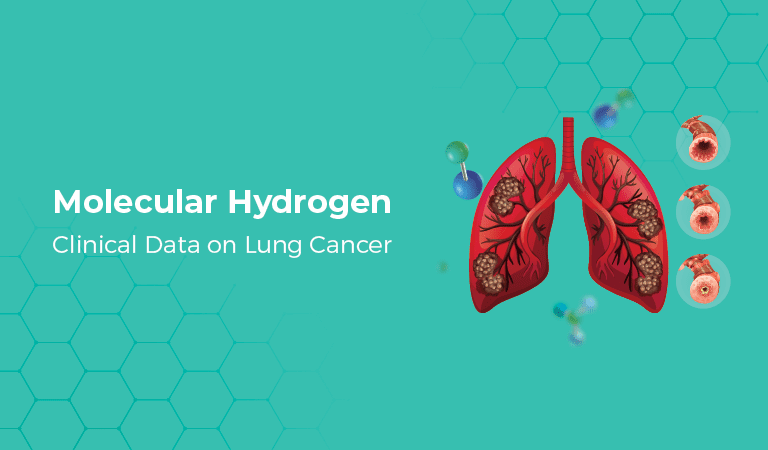Lung Cancer
June 7, 2022 2022-11-24 10:35Lung Cancer

Clinical Data on Lung Cancer Patients
In 2019, various researchers and doctors from some of the leading universities and Hospitals of China conducted a detailed study on response of Molecular Hydrogen Inhalation by Stage ¾ cancer patients.
Study: A prospective follow-up study of 82 patients with stage III and IV cancer treated with hydrogen inhalation using the “real world evidence” method.
Hydrogen Inhalation Method: Hydrogen was produced by a hydrogen-oxygen nebulizer. The patient remained seated or recumbent, inhaled a mixture of hydrogen (66.7%) and oxygen (33.3%) with spontaneous breathing in a nasal tube or mask and a gas flow rate of 3000 mL/min. The hydrogen inhalation should be continued for > 3 hours per day for at least 3 consecutive months.
Result: After 3–46 months of follow-up, 12 patients died in stage IV. After 4 weeks of hydrogen inhalation, patients reported significant improvements in fatigue, insomnia, anorexia, and pain. Furthermore, 41.5% of patients had improved physical status, with the best effect achieved in lung cancer patients and the poorest in patients with pancreatic and gynaecologic cancers. Of the 58 cases with one or more abnormal Tumor markers elevated, the markers were decreased at 13–45 days (median 23 days) after hydrogen inhalation in 36.2%. The greatest marker decrease was in achieved Lung cancer and the lowest in pancreatic and hepatic malignancies. Of the 80 cases with tumours visible in imaging, the total disease control rate was 57.5%, with complete and partial remission appearing at 21–80 days (median 55 days) after hydrogen inhalation. The disease control rate was significantly higher in stage III patients than in stage IV patients (83.0% and 47.7%, respectively), with the lowest disease control rate in pancreatic cancer patients. No haematological toxicity was observed although minor adverse reactions that resolved spontaneously were seen in individual cases.
Conclusion: In patients with advanced cancer, inhaled hydrogen can improve patients’ quality-of-life and control cancer progression. Hydrogen inhalation is a simple, low-cost treatment with few adverse reactions that warrants further investigation as a strategy for clinical rehabilitation of patients with advanced cancer.
Study: A prospective follow-up study of 82 patients with stage III and IV cancer treated with hydrogen inhalation using the “real world evidence” method.
Hydrogen Inhalation Method: Hydrogen was produced by a hydrogen-oxygen nebulizer. The patient remained seated or recumbent, inhaled a mixture of hydrogen (66.7%) and oxygen (33.3%) with spontaneous breathing in a nasal tube or mask and a gas flow rate of 3000 mL/min. The hydrogen inhalation should be continued for > 3 hours per day for at least 3 consecutive months.
Result: After 3–46 months of follow-up, 12 patients died in stage IV. After 4 weeks of hydrogen inhalation, patients reported significant improvements in fatigue, insomnia, anorexia, and pain. Furthermore, 41.5% of patients had improved physical status, with the best effect achieved in lung cancer patients and the poorest in patients with pancreatic and gynaecologic cancers. Of the 58 cases with one or more abnormal Tumor markers elevated, the markers were decreased at 13–45 days (median 23 days) after hydrogen inhalation in 36.2%. The greatest marker decrease was in achieved Lung cancer and the lowest in pancreatic and hepatic malignancies. Of the 80 cases with tumours visible in imaging, the total disease control rate was 57.5%, with complete and partial remission appearing at 21–80 days (median 55 days) after hydrogen inhalation. The disease control rate was significantly higher in stage III patients than in stage IV patients (83.0% and 47.7%, respectively), with the lowest disease control rate in pancreatic cancer patients. No haematological toxicity was observed although minor adverse reactions that resolved spontaneously were seen in individual cases.
Conclusion: In patients with advanced cancer, inhaled hydrogen can improve patients’ quality-of-life and control cancer progression. Hydrogen inhalation is a simple, low-cost treatment with few adverse reactions that warrants further investigation as a strategy for clinical rehabilitation of patients with advanced cancer.

Changes in tumor markers in advanced cancer patients with differnet tumor types


